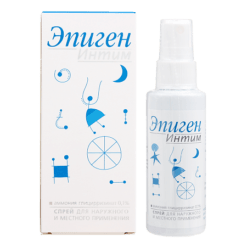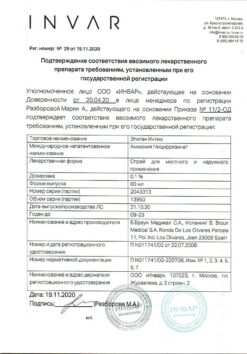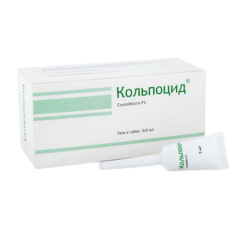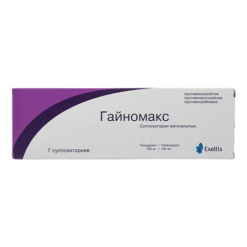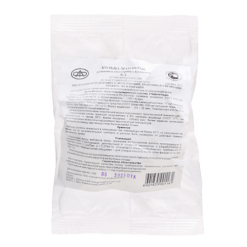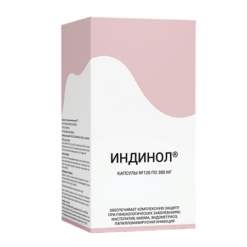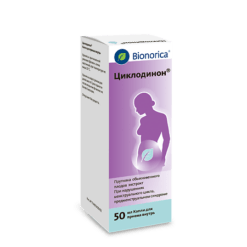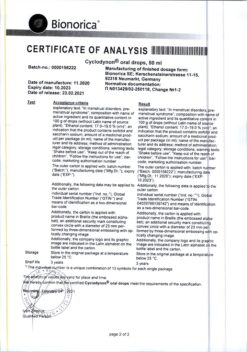No products in the cart.
Tri-regol, 21 pcs.
€12.08 €10.07
EAN: 5997001358863
SKU: 207518
Categories: Contraceptive, Gynecology and Obstetrics, Hormonal, Medicine
Description
Pharmacodynamics
Combined (three-phase) oral estrogen-gestagen contraceptive drug. When taken it inhibits pituitary gonadotropic hormone secretion.
The sequential administration of coated tablets containing different amounts of gestagen (levonorgestrel) and estrogen (ethinylestradiol) ensures concentrations of these hormones in blood close to their concentrations during normal menstrual cycle and promotes endometrial secretion.
The contraceptive effect is associated with several mechanisms. Under the influence of levonorgestrel there is a blockade of the release of releasing releasing factors (luteinizing and follicle stimulating hormones) of the hypothalamus, inhibition of secretion of gonadotropic hormones by the pituitary gland, which leads to inhibition of maturation and exit of the egg ready for fertilization (ovulation).
Ethinylestradiol maintains high viscosity of cervical mucus (makes it difficult for sperm to enter the uterine cavity). Along with contraceptive effect, menstrual cycle is normalized due to replenishment of endogenous hormone levels by hormonal components of Tri-Regol® tablets. During the seven-day periods when there is another break in taking the drug, uterine bleeding occurs.
Pharmacokinetics
Levonorgestrel is quickly absorbed (less than 4 hours). Levonorgestrel has no “first pass” effect through the liver. The elimination half-life is 8-30 hours (average 16 hours). Most of the levonorgestrel in the blood is bound to albumin and to globulin that binds sex hormones.
Ethinylestradiol is rapidly and almost completely absorbed from the gastrointestinal tract. The maximum plasma concentration is reached between 1-1.5 hours. The elimination half-life is 26±6.8 hours. Ethinylestradiol has an inherent “first pass” effect through the liver (so-called “first pass” effect). Metabolism is carried out in the liver and intestine.
When administered orally, ethinylestradiol is excreted within 12 hours from the blood plasma.
The metabolites of ethinylestradiol: water-soluble derivatives of sulfate or glucuronide conjugation, enter the intestine with the bile, where they undergo disintegration with intestinal bacteria. 60% of levonorgestrel is excreted by the kidneys, 40% through the intestines, 40% of ethinylestradiol is excreted by the kidneys and 60% through the intestines.
Indications
Indications
Oral contraception.
Pharmacological effect
Pharmacological effect
Pharmacodynamics
Combined (three-phase) oral contraceptive estrogen-progestogen drug. When taken, it inhibits the pituitary secretion of gonadotropic hormones.
Sequential administration of film-coated tablets containing varying amounts of progestogen (levonorgestrel) and estrogen (ethinyl estradiol) provides concentrations of these hormones in the blood close to their concentrations during the normal menstrual cycle and promotes secretory transformation of the endometrium.
The contraceptive effect is associated with several mechanisms. Under the influence of levonorgestrel, the release of releasing factors (luteinizing and follicle-stimulating hormones) of the hypothalamus is blocked, the secretion of gonadotropic hormones by the pituitary gland is inhibited, which leads to inhibition of the maturation and release of an egg ready for fertilization (ovulation).
Ethinyl estradiol maintains the high viscosity of cervical mucus (it makes it difficult for sperm to enter the uterine cavity). Along with the contraceptive effect, the menstrual cycle is normalized by replenishing the level of endogenous hormones with the hormonal components of Tri-Regol® tablets. In seven-day periods, when the next break in taking the drug follows, uterine bleeding occurs.
Pharmacokinetics
Levonorgestrel is rapidly absorbed (less than 4 hours). Levonorgestrel does not have a first-pass effect through the liver. The half-life is 8-30 hours (average 16 hours). Most of the levonorgestrel in the blood is bound to albumin and sex hormone-binding globulin.
Ethinyl estradiol is rapidly and almost completely absorbed from the gastrointestinal tract. The maximum concentration in plasma is achieved in the range of 1-1.5 hours. The half-life is 26±6.8 hours. Ethinyl estradiol has a “first pass” effect through the liver (the so-called “first pass” effect). Metabolism occurs in the liver and intestines.
When taken orally, ethinyl estradiol is released from the blood plasma within 12 hours.
Ethinyl estradiol metabolites: water-soluble derivatives of sulfate or glucuronide conjugation enter the intestine with bile, where they undergo disintegration with the help of intestinal bacteria. 60% of levonorgestrel is excreted by the kidneys, 40% by the intestines, 40% of ethinyl estradiol is excreted by the kidneys and 60% by the intestines.
Special instructions
Special instructions
Before starting to use the drug, it is necessary to exclude pregnancy and conduct a general medical and gynecological examination (breast examination, cytological smear analysis).
While taking the drug, regular gynecological examinations are required every 6 months.
The use of oral contraception is allowed no earlier than 6 months after viral hepatitis and subject to normalization of liver functions.
If sharp pain appears in the upper abdomen, hepatomegaly or signs of intra-abdominal hemorrhage, a liver tumor may be suspected. In this case, taking the drug should be stopped.
If acyclic bleeding occurs, it is possible to continue taking Tri-Regol® after the attending physician has ruled out organic pathology.
If abnormal liver function is detected during use of the drug, the question of the advisability of continuing to take the drug Tri-Regol® should be decided.
In case of vomiting or diarrhea, the drug should be continued, and it is recommended to additionally use another, non-hormonal method of contraception.
At least 3 months before the planned pregnancy, the drug must be stopped.
Under the influence of oral contraceptives (due to the estrogen component), some laboratory parameters may change (functional parameters of the liver, kidneys, adrenal glands, thyroid gland, blood coagulation and fibrinolytic factors, levels of lipoproteins and transport proteins).
The drug should be stopped immediately in the following cases:
– for the first time or worsening migraine-like or unusually severe headache, for acute deterioration of visual acuity, for suspected thrombosis or heart attack;
– with a sharp increase in blood pressure, the appearance of jaundice or hepatitis without jaundice, the occurrence of generalized itching or an increase in epileptic seizures;
– upon pregnancy;
– 6 weeks before the planned operation, with prolonged immobilization (for example, after injury).
The effect of the drug on the ability to drive a car and other mechanisms
Taking the drug does not affect the ability to drive a car or operate other mechanisms.
Active ingredient
Active ingredient
Ethinyl estradiol, Levonorgestrel
Composition
Composition
active substances:
Tablets I: contain 0.03 mg ethinyl estradiol and 0.05 mg levonorgestrel,
Tablets II: contain 0.04 mg ethinyl estradiol and 0.075 mg levonorgestrel,
Tablets III: Contains 0.03 mg ethinyl estradiol and 0.125 mg levonorgestrel.
excipients
Tablets I.
Core: colloidal silicon dioxide, magnesium stearate, talc, corn starch, lactose monohydrate (33.0 mg).
Shell: sucrose, talc, calcium carbonate, titanium dioxide (E171), copovidone, macrogol 6000, colloidal silicon dioxide, povidone, carmellose sodium, red iron oxide (E172).
Tablets II.
Core: colloidal silicon dioxide, magnesium stearate, talc, corn starch, lactose monohydrate (33.0 mg).
Shell: sucrose, talc, calcium carbonate, titanium dioxide (E171), copovidone, macrogol 6000, colloidal silicon dioxide, povidone, carmellose sodium.
Tablets III.
Core: colloidal silicon dioxide, magnesium stearate, talc, corn starch, lactose monohydrate (33.0 mg).
Shell: sucrose, talc, calcium carbonate, titanium dioxide (E171), copovidone, macrogol 6000, colloidal silicon dioxide, povidone, carmellose sodium, yellow iron oxide (E172).
Pregnancy
Pregnancy
During pregnancy and lactation, taking Tri-Regol® is contraindicated.
Contraindications
Contraindications
Hypersensitivity to any component of the drug.
Pregnancy, breastfeeding, severe liver diseases, liver tumors, congenital hyperbilirubinemia (Gilbert, Dubin-Johnson and Rotor syndromes), cholelithiasis, cholecystitis, chronic colitis; the presence or indication in the anamnesis of severe cardiovascular (including decompensated heart defects) and cerebrovascular changes, thromboembolism and predisposition to them, phlebitis of the deep veins of the lower extremities, hormone-dependent malignant neoplasms of the genital organs and mammary glands (including suspicion of them), familial forms of hyperlipidemia, arterial hypertension with systolic/diastolic blood pressure 160/100 mm Hg. and above, surgical interventions, surgical operations on the lower extremities, prolonged immobilization, extensive injuries, pancreatitis (including a history), accompanied by severe hypertriglyceridemia and hyperlipidemia, jaundice due to taking medications containing steroids, severe forms of diabetes mellitus, sickle cell anemia, chronic hemolytic anemia, vaginal bleeding of unknown etiology, migraine, hydatidiform mole, otosclerosis with worsening during previous pregnancy(ies); idiopathic jaundice of pregnant women, severe skin itching of pregnant women, history of herpes during pregnancy; smoking over the age of 35, age over 40; lactase deficiency, lactose intolerance, glucose-galactose malabsorption (the dosage form of the drug contains lactose).
WITH CAUTION
Compensated diabetes mellitus without vascular complications, arterial hypertension with systolic/diastolic blood pressure up to 160/100 mm Hg, varicose veins, multiple sclerosis, epilepsy, chorea minor, porphyria, tetany, bronchial asthma, adolescence (without regular ovulatory cycles), uterine fibroids, mastopathy, depression, tuberculosis.
Side Effects
Side Effects
Side effects observed with the use of the drug are classified into categories depending on the frequency of their occurrence: very often ≥1/10; often >1/100, ≤1/10, sometimes ≥1/1000, ≤1/100; rarely ≥1/10000, ≤1/1000; very rarely ≤1/10000 including isolated reports.
Nausea, vomiting, headache, engorgement of the mammary glands, increased body weight, decreased libido, depressed mood, chloasma, intermenstrual bleeding, in some cases – swelling of the eyelids, conjunctivitis, blurred vision, discomfort when wearing contact lenses (these phenomena are temporary and disappear after discontinuation without prescribing any therapy).
Rarely, increased concentrations of triglycerides, blood glucose, decreased glucose tolerance, increased blood pressure, jaundice, hepatitis, liver adenoma, gallbladder diseases (for example, cholelithiasis, cholecystitis), thrombosis and venous thromboembolism, skin rash, hair loss, increased vaginal discharge, vaginal candidiasis, increased fatigue, diarrhea.
With long-term use, generalized itching, cramps of the calf muscles, hearing loss, increased frequency of epileptic seizures, and deepening of the voice may very rarely occur.
Interaction
Interaction
Use the drug with caution when taking simultaneously:
ampicillin, rifampicin, chloramphenicol, neomycin, polymyxin B, sulfonamides, tetracyclines, dihydroergotamine, tranquilizers, phenylbutazone, since these drugs can weaken the contraceptive effect, it is recommended to additionally use another, non-hormonal contraceptive method;
anticoagulants, coumarin or indanedione derivatives (it may be necessary to urgently determine the prothrombin index and change the dose of the anticoagulant);
tricyclic antidepressants, maprotiline, beta-blockers (bioavailability and therefore toxicity may increase);
oral hypoglycemic drugs, insulin (it may be necessary to change their doses);
bromocriptine (reduced effectiveness);
drugs with possible hepatotoxic effects, primarily dantrolene (risk of increased hepatotoxicity, especially in women over 35 years of age).
Overdose
Overdose
Symptoms: nausea, uterine bleeding.
Treatment: when the first signs of overdose appear in the first 2-3 hours, gastric lavage is recommended.
Symptomatic therapy is indicated.
There is no antidote.
Storage conditions
Storage conditions
At 15–30 °C
Shelf life
Shelf life
2 years
Manufacturer
Manufacturer
Gedeon Richter, Hungary
Additional information
| Shelf life | 5 years |
|---|---|
| Conditions of storage | At 15-30 °C |
| Manufacturer | Gedeon Richter, Hungary |
| Medication form | pills |
| Brand | Gedeon Richter |
Related products
Gynecology and Obstetrics
Buy Tri-regol, 21 pcs. with delivery to USA, UK, Europe and over 120 other countries.


